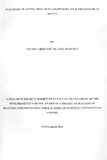| dc.contributor.author | Murungi, Wendy C | |
| dc.date.accessioned | 2013-02-28T06:08:01Z | |
| dc.date.issued | 2011-11 | |
| dc.identifier.citation | MBA Thesis | en |
| dc.identifier.uri | http://erepository.uonbi.ac.ke:8080/xmlui/handle/123456789/12188 | |
| dc.description | Strategic planning practices adopted by milk processors in Kenya | en |
| dc.description.abstract | Strategic planning is essential to all organizations. Without strategic plans, organizations lose their direction and purpose. Organizations are required to develop sustainable and valuable vision and mission statements, core values and objectives to reflect their strategic relevance and intent. This can successfully be implemented by organizations adopting viable and sustainable strategic plans. The strategic planning process enables organizations to match their capabilities and limited resources to the dynamic environment. Strategic planning also ensures organizations to identify the strategies that will best fit and match their resources and capabilities to the external and internal demands of the environment. Strategic planning is effective in establishing an organization’s long term direction therefore ensuring that the firm
looks into the future thereby assuming a more proactive posture.
The dairy industry has faced tremendous growth since its inception and has gone through various changes in terms of liberalization therefore increasing competition for milk and milk products. Strategic planning enables organizations in the dairy industry to survive the complex, turbulent and competitive business environment.
The study sought to identify the strategic planning practices adopted by milk processors in Kenya. The target population of the study was all the active milk processors in Kenya. The researcher then sampled 26 active milk processors registered by the Kenya Dairy Board in year 2010. The study managed to obtain 18 completed questionnaires therefore representing a 69% response rate.
Primary data was collected using a semi-structured questionnaire. The respondents targeted were managers who were involved in the strategy formulation and implementation process in their organizations. The questionnaire was administered through drop and pick-later method to the target population. The data was coded and entered into Statistical Software for Social Science (SPSS) and descriptive analysis ran. Measures of central tendency were applied on the data and the findings, conclusion and recommendations were summarized in the study.
Data was presented using bar graphs, percentages and frequency tables. The study concluded that majority of the milk processors in Kenya had formal documented mission and vision statements. The study revealed that majority of the milk processors also had short term objectives which were reviewed continuously. Majority of the milk processors had their vision and mission statements as well as their short term objectives set by top management. The study also concluded that majority of the milk processors had strategic plans in place which run between two to three years.
The milk processors operated in a fairly stable environment though they experienced a
number of challenges in executing the strategic planning process. The study revealed that
majority of the milk processors conducted a SWOT and PESTEL analysis. The environmental analysis enabled the milk processors determine the factors affecting strategic planning therefore enhancing the execution of the entire strategic planning process.
The research recommended that all milk processors in Kenya should have formal documented mission and vision statements understood by all stakeholders in the organization. The study emphasized the importance of top management commitment to the entire strategic planning process and that the top management should cascade the strategic plans to all employees of the organization. The study recommended extensive and continuous assessment of the organizations’ external and internal environment by to ensure their survival in the competitive environment.
The study recommended that future studies could be done to explore the impact of the strategic planning practices on the financial performance of the milk processors in Kenya.
Further research could also be carried out on the impact of challenges identified in the study to the strategic planning process. A further study could also be done on the impact of various environmental factors affecting the milk processors in Kenya on the successful implementation and execution of the entire strategic planning process. | en |
| dc.description.sponsorship | University of Nairobi | en |
| dc.language.iso | en | en |
| dc.publisher | University of Nairobi, | |
| dc.subject | Strategic planning | en |
| dc.subject | Milk processing | en |
| dc.subject | Kenya | en |
| dc.title | Strategic Planning Practices Adopted by Milk Processors in Kenya | en |
| dc.type | Thesis | en |
| local.publisher | School of Business, University of Nairobi | en |

